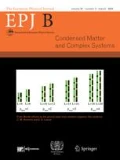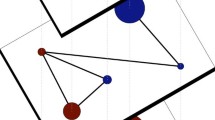Abstract
We study the effect of a network of contacts on the emergence of cooperation on social dilemmas under myopic best response dynamics. We begin by summarizing the main features observed under less intellectually demanding dynamics, pointing out their most relevant general characteristics. Subsequently we focus on the new framework of best response. By means of an extensive numerical simulation program we show that, contrary to the rest of dynamics considered so far, best response is largely unaffected by the underlying network, which implies that, in most cases, no promotion of cooperation is found with this dynamics. We do find, however, nontrivial results differing from the well-mixed population in the case of coordination games on lattices, which we explain in terms of the formation of spatial clusters and the conditions for their advancement, subsequently discussing their relevance to other networks.
Similar content being viewed by others
References
E. Pennisi, Science 309, 93 (2005)
W.D. Hamilton, J. Theor. Biol. 7, 1 (1964)
R. Axelrod, W.D. Hamilton, Science 211, 1390 (1981)
S.J. Maynard, Evolution and the Theory of Games (Cambridge University Press, Cambridge, 1982)
M.A. Nowak, Science 314, 1560 (2006)
C.P. Roca, J.A. Cuesta, A. Sánchez, Phys. Rev. Lett. 97, 158701 (2006)
M.A. Nowak, R.M. May, Nature 359, 826 (1992)
A. Rapoport, A.M. Chammah, Prisoner’s Dilemma: A Study in Conflict and Cooperation (University of Michigan Press, Ann Arbor, 1965)
G. Szabó, G. Fáth, Phys. Rep. 446, 97 (2007)
C.P. Roca, J.A. Cuesta, A. Sánchez, e-print arXiv:0806.1649 (2008)
F.C. Santos, J.M. Pacheco, T. Lenaerts, Proc. Natl. Acad. Sci. USA 103, 3490 (2006)
J. Gómez-Gardeñes, M. Campillo, L.M. Floría, Y. Moreno, Phys. Rev. Lett. 98, 108103 (2007)
A. Matsui, J. Econ. Theory 57, 343 (1992)
L. Blume, Games Econ. Behav. 5, 387 (1993)
G. Ellison, Econometrica 61, 1047 (1993)
J. Hofbauer, K. Sigmund, Evolutionary Games and Population Dynamics (Cambridge University Press, Cambridge, 1998)
M.W. Macy, A. Flache, Proc. Natl. Acad. Sci. USA 99, 7229 (2002)
A.N. Licht, Yale J. Int. Law 24, 61 (1999)
B. Skyrms, The Stag Hunt and the Evolution of Social Structure (Cambridge University Press, Cambridge, 2003)
J.S. Maynard, G.R. Price, Nature 246, 15 (1973)
R. Sugden, Economics of Rights, Co-operation and Welfare, 2nd edn. (Palgrave Macmillan, Hampshire, 2004)
H. Gintis, Game Theory Evolving (Princeton University Press, 2000)
A. Rapoport, M. Guyer, General Systems 11, 203 (1966)
M.E.J. Newman, SIAM Review 45, 167 (2003)
C. Hauert, M. Doebeli, Nature 428, 643 (2004)
M. Sysi-Aho, J. Saramäki, J. Kertész, K. Kaski, Eur. Phys. J. B 44, 129 (2005)
B. Bollobas, Random Graphs (Cambridge University Press, Cambridge, 2001)
A.-L. Barabási, R. Albert, Science 286, 509 (1999)
K. Klemm, V.M. Eguíluz, Phys. Rev. E 65, 036123 (2002)
M.O. Jackson, A. Wolinsky, J. Econ. Theory 71, 44 (1996)
S. Goyal, F. Vega-Redondo, J. Econ. Theory 137, 460 (2007)
C. Taylor, D. Fudenberg, A. Sasaki, M.A. Nowak, Bull. Math. Biol. 66, 1621 (2004)
V. Hatzopoulos, H.J. Jensen, Phys. Rev. E 78, 011904 (2008)
Author information
Authors and Affiliations
Corresponding author
Rights and permissions
About this article
Cite this article
Roca, C., Cuesta, J. & Sánchez, A. Promotion of cooperation on networks? The myopic best response case. Eur. Phys. J. B 71, 587–595 (2009). https://doi.org/10.1140/epjb/e2009-00189-0
Received:
Revised:
Published:
Issue Date:
DOI: https://doi.org/10.1140/epjb/e2009-00189-0




